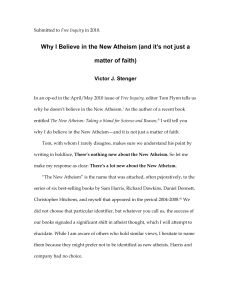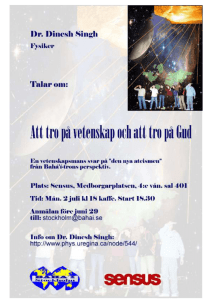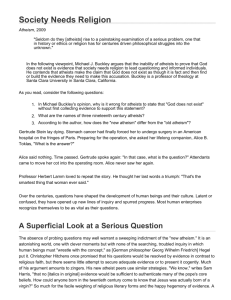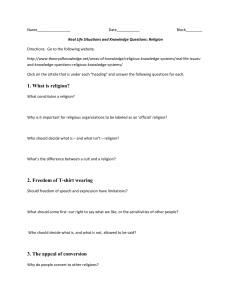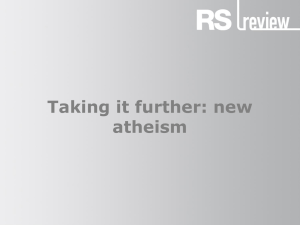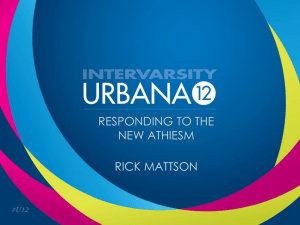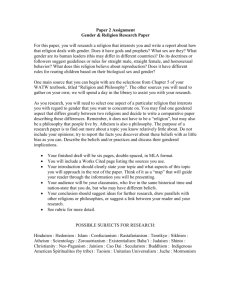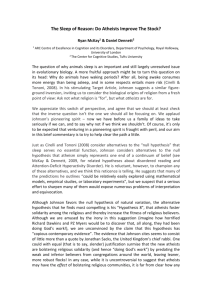An Examination of the New Atheism: Annotated
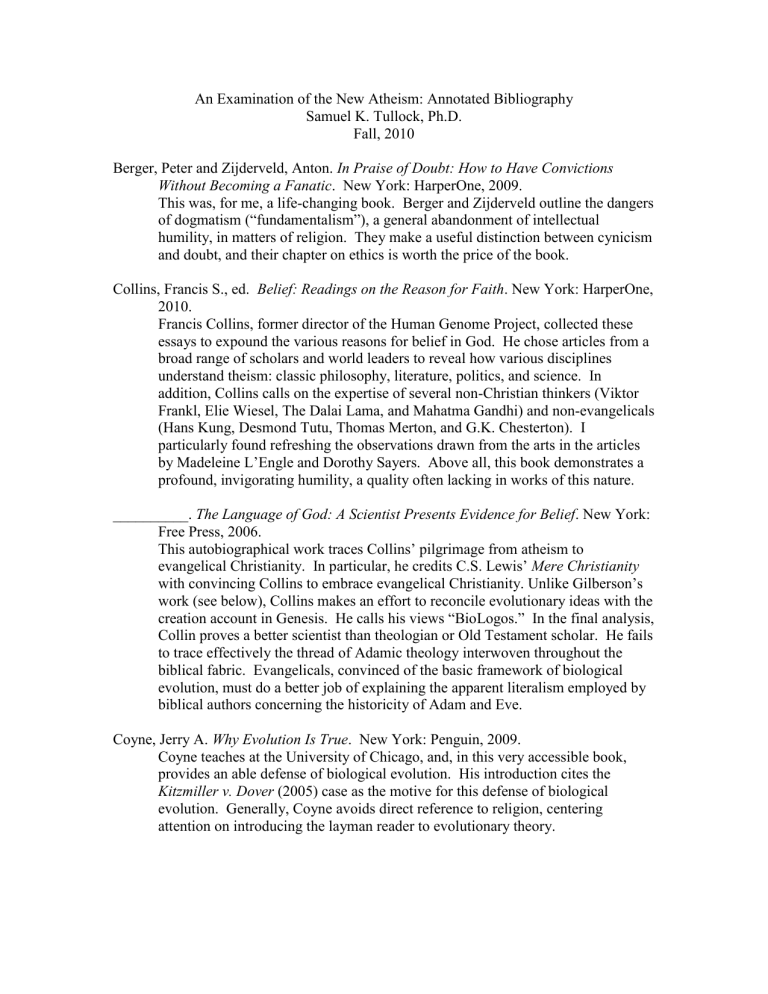
An Examination of the New Atheism: Annotated Bibliography
Samuel K. Tullock, Ph.D.
Fall, 2010
Berger, Peter and Zijderveld, Anton. In Praise of Doubt: How to Have Convictions
Without Becoming a Fanatic . New York: HarperOne, 2009.
This was, for me, a life-changing book. Berger and Zijderveld outline the dangers of dogmatism (“fundamentalism”), a general abandonment of intellectual humility, in matters of religion. They make a useful distinction between cynicism and doubt, and their chapter on ethics is worth the price of the book.
Collins, Francis S., ed. Belief: Readings on the Reason for Faith . New York: HarperOne,
2010.
Francis Collins, former director of the Human Genome Project, collected these essays to expound the various reasons for belief in God. He chose articles from a broad range of scholars and world leaders to reveal how various disciplines understand theism: classic philosophy, literature, politics, and science. In addition, Collins calls on the expertise of several non-Christian thinkers (Viktor
Frankl, Elie Wiesel, The Dalai Lama, and Mahatma Gandhi) and non-evangelicals
(Hans Kung, Desmond Tutu, Thomas Merton, and G.K. Chesterton). I particularly found refreshing the observations drawn from the arts in the articles by Madeleine L’Engle and Dorothy Sayers. Above all, this book demonstrates a profound, invigorating humility, a quality often lacking in works of this nature.
__________. The Language of God: A Scientist Presents Evidence for Belief . New York:
Free Press, 2006.
This autobiographical work traces Collins’ pilgrimage from atheism to evangelical Christianity. In particular, he credits C.S. Lewis’ Mere Christianity with convincing Collins to embrace evangelical Christianity. Unlike Gilberson’s work (see below), Collins makes an effort to reconcile evolutionary ideas with the creation account in Genesis. He calls his views “BioLogos.” In the final analysis,
Collin proves a better scientist than theologian or Old Testament scholar. He fails to trace effectively the thread of Adamic theology interwoven throughout the biblical fabric. Evangelicals, convinced of the basic framework of biological evolution, must do a better job of explaining the apparent literalism employed by biblical authors concerning the historicity of Adam and Eve.
Coyne, Jerry A. Why Evolution Is True . New York: Penguin, 2009.
Coyne teaches at the University of Chicago, and, in this very accessible book, provides an able defense of biological evolution. His introduction cites the
Kitzmiller v. Dover (2005) case as the motive for this defense of biological evolution. Generally, Coyne avoids direct reference to religion, centering attention on introducing the layman reader to evolutionary theory.
Dawkins, Richard. The God Delusion . New York: Mariner Books, 2006.
Dawkins is the father of Neo-Atheism. His earlier works ( The Selfish Gene
The Blind Watchmaker ) met with high critical acclaim, but, in recent years, and
Dawkins’ involvement in the theism debate has brought him even greater notoriety. His “viral” imagery of religious belief has influenced Daniel Dennett and many other atheists, and he introduced the “Brights” terminology to describe those who eschewed the influence of religion. Also, he honed the concept of
“memes” to explain the social contagion of religion. One could hardly overestimate Dawkins’ influence on this debate.
Dennett, Daniel C. Breaking the Spell: Religion as a Natural Phenomenon . New York:
Penguin Books, 2006.
Dennett teaches philosophy at Tufts University, and, along with Dawkins and
Hitchens, has provided substantial leadership for the New Atheists. He writes with clarity, charm, and humor; however, like Dawkins, he demonstrates an abysmal misunderstanding of theology and religious history. He advocates a naturalistic, evolutionary model for the development of religion idealogy.
Eagleton, Terry. Reason, Faith, and Revolution: Reflections on the God Debate . New
Haven: 2009.
The chapters in this book emerged from a series of lectures delivered, by
Eagleton, at Yale, in 2008. The author’s Marxist ideology, in this case, does not ensure his uncritical approval of Dawkins and Hitchens (Eagleton calls them
“Ditchens”). The arguments in these wonderfully nuanced essays mitigate against easy summary in an informal annotated bibliography; so, read this book.
Ecklund, Elaine Howard. Science vs. Religion: What Scientists Really Think . New York:
Oxford Press, 2010.
Rice University sociologist Elaine Ecklund challenges common assumptions about the religious beliefs of academic scientists. She states, “The
‘insurmountable hostility’ between science and faith is a caricature, a thoughtcliché, perhaps useful as a satire on groupthink, but hardly representative of reality.” Her work explores the religious beliefs of scientists, and how scientists interact with non-scientists on the subject of religion.
Ehrman, Bart D.
God’s Problem: How the Bible Fails to Answer Our Most Important
Question—Why We Suffer . New York: HarperOne, 2008.
All three of these books contain a strong autobiographical element tracing
Ehrman’s transformation from evangelical Christian to his loss of religious faith during his studies at Princeton Seminary. While Ehrman writes with charming prose, he simply restates, in these popular books, the standard arguments made by biblical higher critics, arguments that have dominated liberal scholarship for well over a hundred years.
_________. Jesus Interrupted: Revealing the Hidden Contradictions in the Bible (and
Why We Don’t Know About Them).
New York: HarperOne, 2009.
_________. Misquoting Jesus: The Story Behind Who Changed the Bible and Why . San
Francisco: Harper San Francisco, 2005.
Flew, Anthony.
There Is a God: How the World’s Most Notorious Atheist Changed His
Mind. New York: HarperOne, 2007.
The late Anthony Flew was, after the death of Bertrand Russell, the world’s most noted atheist; however, in his last years, Flew became a theist, not a Christian, but a latter-day deist. This autobiographical work recounts Flew’s atheism and how, in his last years, he changed his mind. His conversion has not escaped the critical analysis of atheists who claim that Roy Abraham Varghese, Flew’s consultant, took advantage of the old man, writing a book a younger Flew would never have approved. The strength of the book may center on a helpful essay, by N.T.
Wright, included in the appendix. Wright is arguably the world’s foremost New
Testament scholar, and he provides an articulate defense of the historicity of the resurrection of Jesus.
Giberson, Karl. Saving Darwin: How to Be a Christian and Believe in Evolution . New
York: HarperOne, 2008.
Saving Darwin promises much more than it delivers. Giberson, science professor at Eastern Nazarene College, makes a coherent argument in favor of materialistic evolution, and he provides a useful summary of the various court cases that have parsed the debate between creationists and evolutionists: the Scopes Trial, the
Arkansas Trial (i.e. Scopes II), and the Dover, Pennsylvania case. Also, the author respectfully debunks the various works produced by creationists like Henry
Morris and Duane Gish. However, Gilberson, a self-proclaimed evangelical, never gets around to describing how Christians can embrace evolution without damaging the superstructure of their theological framework. Gilberson just does not deliver—perhaps he can’t.
Gould, Stephen Jay. Rocks of Ages: Science and Religion in the Fullness of Life . New
York: Ballantine Books, 1999.
First, I should express my profound appreciation for Gould, late professor of zoology at Harvard University. His works always display an erudite wit and charm, combined with thorough scholarship. Though, at the outset of this book, he states clearly his own agnosticism, he also expresses respect for people of faith.
The thesis of the book centers on Gould’s conviction that religion and science, in effect, speak different languages, non-overlapping magisterial (NOMA). Dawkins and others have criticized NOMA for failing to challenge religious belief.
Progressive religious believers may also have some concern that Gould’s views could preclude any meaningful dialog between religion and science.
Hart, David Bentley.
Atheist Delusions: The Christian Revolution and It’s Fashionable
Enemies . New Haven: Yale Press, 2009.
The designation “harshest critic” of the New Atheists aptly applies to David
Bentley Hart. The following sentence summarizes his position, “But atheism that consists entirely of vacuous arguments afloat on oceans of historical ignorance, made turbulent by storms of strident self-righteousness, is as contemptible as any other form of dreary fundamentalism.” Hart’s strident rhetoric, at times, trumps his impressive knowledge of Christian theology and church history. His criticisms of the Neo-Atheists’ theological and historical understanding deserves serious reflection, but he lacks the chops to subdue their scientific objections to faith.
Hedges, Chris.
When Atheism Becomes Religion: America’s New Fundamentalists . New
York, Free Press, 2008.
Hedges, a Pulitzer Prize winner and author of American Fascists: The Christian
Right and the War on America , wrote this book as a rebuttal to the “intolerant, chauvinistic, and bigoted” views of the Neo-Atheists. Indeed, Hedges observes that these atheists fall into a kind of secular fundamentalism as disturbing as religious conservatives. Among other criticisms, he faults the atheists with a rigid materialism that short circuits any dialog between sincere people on both sides of the theism issue.
Hitchens, Christopher. God Is Not Great: How Religion Poisons Everything . New York:
Twelve Books, 2007.
Hitchens’ impressive journalistic career has led him to write for many prestigious journals and periodicals; however, his popularity grew significantly in the wake of his association with the New Atheism and the publication, in 2007, of God Is Not
Great: How Religion Poisons Everything . Unlike Dawkins and Dennett, Hitchens devotes much of work to debunking all religious faiths, including Islam and
Eastern Religions. He avows an “equal opportunity” aversion to religion in any expression, especially Christianity. Religion, he claims, does incalculable damage to human beings; indeed, he compares family religious training to child abuse.
Hitchens, Peter. The Rage Against God: How Atheism Led Me to Faith . Grand Rapids,
Michigan: Zondervan, 2010.
Peter Hitchens, younger brother of Christopher Hitchens, followed a similar intellectual path to his sibling; however, several years of living in the former
Soviet Union persuaded Peter to reconsider his atheism and socialism. This work is part biography, part Christian apology. The introduction forecasts discussion of
“fundamental failures of three atheistic arguments.” He challenges: (1) the assertion that conflicts, fought in the name of religion, are always about religion;
(2) the ethical quandary created by atheism; (3) the atheistic claims of atheistic states. In this last argument Hitchens asserts the “religious” nature of totalitarian, atheistic states.
Lobdell, William. Losing My Religion: How I Lost My Faith Reporting on Religion in
America—and Found Peace . New York: HarperCollins, 2009.
William Lobdell, former religion reporter for the Los Angeles Times, provides, in this work, a compelling description of his de-conversion from evangelical
Christianity. The book highlights the emotional/experiential elements of leaving one’s faith, and, in doing so, the author acknowledges the complexity of religious conviction. Losing My Religion counterbalances the stifling materialism of atheists like Hitchens and Dawkins. Lobdell, also, does not allow his arguments to degenerate into cartoonish characterizations of religious believers, and he avoids the strutting “certainty” that characterizes the arguments of other popular atheistic writers. Religious folk, in particular, would be wise to consider
Lobdell’s narrative of his loss of faith.
Loftus, John W. Why I Became an Atheist: A Former Preacher Rejects Christianity . New
York: Prometheus Books, 2008.
John Loftus is an eccentric, and, at first glance, one may dismiss this book as the ruminations of a crank. Think again. Despite his oddity, Loftus has written a formidable defense of atheism. A former evangelical minister and well-trained theologian, Loftus left the faith after a personal crisis, a crisis that led him to question the theological principles he once embraced. In an orderly, wellresearched manner, the book deals with the major issues that divide theists and atheists. Furthermore, Loftus does not gloss over or ignore important Christian thinkers. He interacts with the thoughts of Augustine, Anselm, Aquinas, and a host of contemporary apologists (Gleason Archer, Richard Swinburne, Henri
Blocher, William Lane Craig, Alvin Plantinga, and Colin Brown).
McGrath. Alister. The Twilight of Atheism: The Rise and Fall of Disbelief in the Modern
World . New York: Doubleday, 2004.
McGrath’s book provides a useful summary and assessment of older forms of atheism, but he deals only briefly with Dawkins. Nonetheless, this is a good read, grounded in McGrath’s impressive mastery of Western intellectual history.
Nicholai, Armand M. The Question of God: C.S. Lewis and Sigmund Freud Debate God,
Love, Sex, and the Meaning of Life . New York: Free Press, 2002.
Nicholai is an associate clinical professor of psychiatry at Harvard Medical Scholl and has taught a course, at Harvard, “The Question of God.” In this course, he examines the writings of Sigmund Freud and Clive Staples Lewis as a means of considering the great questions of life.
Nietzsche, Friedrich. The Gay Science . 1882.
Nietzsche wrote these aphorisms a few years before his institutionalization for syphilitic madness. He introduced, in this work, the central themes developed more fully in Thus Spoke Zarathustra , in particular, his assertion of the death of
God. In my judgment, Nietzsche provides the most energetic, coherent, comprehensive critique of religious faith. If you want to understand atheism, read
Nietzsche. If you are a person of faith, a person courageous enough to consider
the claims of atheism, read Nietzsche. If you want to weigh the arguments for and against the theodicy issue, read Nietzsche. If you want a glimpse of the world atheism would produce, read Nietzsche. Just in case you missed my point, read
Nietzsche!
Ray, Darrel. The God Virus: How Religion Infects Our Lives and Culture . Bonner
Springs, Kansas: IPC Press, 2009.
Ray, another former evangelical, simply parrots the “virus” model of Dennett and
Dawkins. At times, it seems he loses sight of the Metaphor and really believes religion is a microbial infestation. Do not waste time with this book.
Schaeffer, Frank.
Patience with God: Faith for People Who Don’t Like Religion (or
Atheism). Cambridge, MA: DeCapo Press, 2009.
Schaeffer, son of former evangelical leaders Francis and Edith Schaeffer, has provided a scathing criticism of both the New Atheists and Christian fundamentalism. Some years ago, he left evangelicalism and joined the Eastern
Orthodox Church, embracing the sacramentalism, theological disctinctives, and mysticism of the ancient church.
This book makes a valuable distinction between the Old Atheism and the New, a distinction worth noting. In particular, Schaeffer points out that the Old Atheists
“paid a steep price” for their views, unlike the Neo-Atheists with their groupies, lucrative book deals, and talk show celebrity status. Schaeffer compares the
“Neos” to the fundamentalists—both view the world through a predetermined lens and claim to possess all the answers to time and eternity.
Wiesel, Elie. Night . New York: Hill and Wang, 1958.
No study of atheism would be complete without a consideration of Wiesel’s
Nobel Prize winning work Night . Theists must honestly confront the formidable theodicy issue, and Wiesel’s wartime experience in Auschwitz and Buchenwald help crystallize the major issues at stake. Wiesel, it seems, remains ambivalent about the existence of God, and this work does not provide “cheap” answers to the perplexing questions raised by the Holocaust. Its chief value centers on the careful definition of the kinds of questions theists must confront.
Wright, N.T. The Resurrection of the Son of God . Minneapolis: Fortress Press, 2003.
This is the third installment of a multi-volume set on Christian origins, by perhaps the most important New Testament scholar of our generation. Proceeding with careful, erudite exposition, Wright concludes that early Christians really did believe in the resurrection of Jesus, in contrast to the “evolutionary” theorists
(Dennett) and the First and Second “Questers” (those who have participated in the so-called “Quest for the historical Jesus”).
